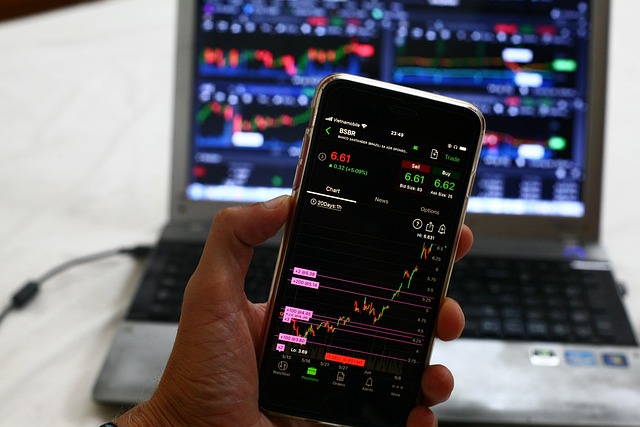Best Bonus for Opening Brokerage Account: Smart Choices & Tips
Author: Jameson Richman Expert
Published On: 2025-11-05
Prepared by Jameson Richman and our team of experts with over a decade of experience in cryptocurrency and digital asset analysis. Learn more about us.
Finding the best bonus for opening brokerage account can save you hundreds — sometimes thousands — of dollars when you start investing or trading. This guide explains the types of bonuses available, how to evaluate the true value behind promotions, step-by-step claiming instructions, tax and regulatory considerations, and real-world examples so you can choose an offer that fits your goals and risk profile.

Why the Opening Bonus Matters
Brokerage sign-up incentives are more than marketing — they're a way for firms to attract new capital and active customers. A lucrative bonus can improve your starting capital (cash, free trades, or assets), lower your effective trading costs, and give you time to test a platform. However, many promotions come with strings attached: trading volume requirements, locked funds, or expirations that reduce real value. Understanding how to compare offers allows you to identify the best bonus for opening brokerage account that delivers real benefit, not just headline value.
Common Types of Brokerage Opening Bonuses
- Cash Bonuses: Direct deposit credited to your account after meeting conditions (e.g., deposit $1,000 and get $100).
- Deposit Matches: Broker matches part or all of your initial deposit up to a cap (e.g., 50% match up to $500).
- Commission-Free Trades: A number of free trades (e.g., 30 commission-free trades) typically for a limited time.
- Free Stocks or Crypto: A random or chosen set of assets awarded when you sign up and verify.
- Fee Rebates or Credits: Credits against trading fees, margin interest, or subscription tools (e.g., premium charting credits).
- Referral Rewards: Bonuses when you sign up via a referral link and/or when you refer others.
How to Evaluate the “Best Bonus for Opening Brokerage Account”
Not all bonuses are created equal. Use this checklist to assess promotions objectively:
- Real Value vs. Headline Value: Convert promos into dollar value and compare to typical trading costs. A $200 bonus may be worth less if it requires $50,000 in trades.
- Minimum Deposit Requirements: High deposit thresholds reduce accessibility and increase risk.
- Minimum or Required Trading Volume: Many offers require executing a set number or dollar volume of trades within a timeframe.
- Time Limits and Vesting: Money that “vests” gradually or expires quickly isn’t as useful.
- Withdrawability: Can you withdraw the bonus or just the profits generated? Some bonuses are non-withdrawable until conditions are met.
- Compatibility with Your Strategy: If you’re a long-term investor, a short-run commission-free trade pack may be less useful than cash or fee credits.
- Platform Quality and Fees: A large bonus can be negated by high ongoing fees. Always compare fee schedules (commissions, spreads, margin rates).
- Regulatory and Tax Implications: Bonuses are often taxable as income; understand reporting.
Check the Fee Schedule — Don’t Be Seduced
Even with a generous opening bonus, high commissions, wide spreads, or expensive tools can neutralize the advantage. Read the fee page carefully. For trading platforms heavily used by active crypto traders, fees and maker/taker tiers matter a lot — for example a clear explanation of Bybit's fee structure can help you estimate net benefit (see a practical Bybit fee explanation here).
For advanced charting utilities, the cost of external tools like TradingView will affect whether a platform-branded credit or subscription free-trial is valuable; read a complete TradingView pricing guide to weigh charting credits against needs. If you trade across multiple windows, resources on using multiple charts effectively can increase the ROI of any charting credit you receive.
Related reading: Bybit fees explained, TradingView pricing guide, Tips for multiple charts in TradingView.

Red Flags and Fine Print to Watch
- Unrealistic Volume Requirements: Promos asking for extreme trading volumes to unlock small bonuses.
- Hidden Restrictions: Bonuses that exclude certain asset classes or instruments.
- High Withdrawal Fees or Freeze Periods: Funds held for long days after meeting conditions.
- Geographic Limitations: Some offers are not available in certain jurisdictions due to regulation.
- Non-Transferable Bonuses: Bonuses that cannot be used for margin or to purchase certain securities.
Examples: Comparing Real Offers
Below are representative examples to illustrate how to compare offers. Specific offers change frequently — always check current promotion pages before deciding.
Example A — Large Cash Bonus with High Deposit Requirement
Offer: $500 cash bonus when you deposit $50,000 and complete X trades in 90 days.
Analysis: The headline looks attractive, but the required deposit is high. If you planned to move $50k anyway, this is decent. If you must shift funds temporarily to qualify, consider opportunity cost and tax implications.
Example B — Commission-Free Trades Pack
Offer: 100 commission-free trades for new accounts.
Analysis: Great for active traders who trade small sizes and would otherwise pay per-trade commissions. Less valuable for buy-and-hold investors. Check for any expiration on the trade pack and whether options/OTC orders are excluded.
Example C — Free Stocks / Crypto on Sign-Up
Offer: Receive 1–5 free fractional stocks or crypto assets worth up to $200 simply for signing up and verifying your account.
Analysis: Easy to claim and low friction. The expected value is often small and assigned randomly, but you get exposure to assets without investment. Make sure the platform doesn’t lock the reward or restrict selling for long periods.
Crypto Exchange Offers — Practical Considerations
Today, many crypto exchanges operate like brokerages for digital assets and incentivize new accounts with attractive bonuses and rebates. If you trade crypto, pay attention to maker/taker fees, deposit/withdrawal fees, and platform stability. See an up-to-date analysis of exchange fee structures when evaluating offers — it can materially change the net benefit. For example, reading a summary of crypto exchange fee dynamics helps you understand what a fee credit or trading rebate is practically worth.
Further reading: Bitcoin market scenarios and levels and ETH queue wait and network delay considerations — both help traders understand market timing and execution risk when taking promotions from crypto trading platforms.
Step-by-Step: Claiming and Maximizing Your Bonus
- Confirm Eligibility: Local regulations, residency, and ID verification (KYC) often determine eligibility. Read the eligibility rules on the promotion page.
- Read the Fine Print: Check minimum deposit, required trade volume, expiration date, and withdrawal rules.
- Estimate Net Value: Convert bonus into a dollar value relative to the costs you’d incur (commissions, spreads, margin interest). Example: a $200 bonus that requires $10,000 deposit and 30 trades — calculate the effective reduction in your trading cost per trade.
- Open Account and Complete KYC: Submit required documents promptly to avoid delays.
- Fulfill Conditions Carefully: Execute required deposits/trades within the specified window. Use limit orders where appropriate to control costs and slippage.
- Document Everything: Keep screenshots, confirmation emails, and transaction records in case customer service disputes arise.
- Withdraw or Redeploy: Once bonus conditions are met and funds clear, decide whether to withdraw, move to a safer vehicle, or use for more trading.
For popular exchange sign-ups, use trusted referral links — they often give you bonus benefits and help verify legitimacy. Examples (affiliate links):
- Create a Binance account (referral)
- Register at MEXC (referral)
- Sign up at Bitget (referral)
- Open a Bybit account (referral)

Tax, Reporting, and Regulatory Considerations
Bonuses are not free from tax or regulatory oversight. In many jurisdictions, a cash bonus or the fair market value of received securities/crypto is taxable as ordinary income if it is not a loan or promotional credit. Keep records and consult a tax professional. For U.S. taxpayers, consult official guidance about taxable income and capital gains (IRS Topic No. 409 is a useful starting point).
Also, know the broker’s regulatory status. For securities in the U.S., brokers are typically members of FINRA and regulated by the SEC. Use FINRA’s BrokerCheck to confirm registration and disciplinary history. For crypto exchanges, check whether they operate under local money transmitter laws or have appropriate licenses.
Helpful resources: FINRA, Broker (finance) - Wikipedia, IRS: Capital Gains & Losses (Topic No. 409).
How Fees and Tools Affect Bonus Value
Some brokers offer bonuses in the form of credits to pay for platform tools (market data, premium charting). Evaluate whether you actually need those tools. If you already pay for third-party charting like TradingView, a platform credit that covers a TradingView subscription could be valuable — but only if the platform allows such credits to be used toward it. Read the provider’s documentation; a complete TradingView pricing guide explains cost tiers and can help you decide whether a credit is meaningful to you.
Execution quality matters. If a broker has poor fills or wide spreads, your bonus will erode quickly. Read independent reviews and watch for order execution reports where available.
Examples of Smart Bonus Use Cases
- New passive investor: Prioritize cash bonuses or free fractional shares that can be held long-term.
- Active trader: Look for commission-free trade packs or fee rebates and pair them with low-maker fee structures.
- Crypto-focused trader: Favor platforms with low withdrawal fees, liquidity, and transparent fee tiers. Cross-reference fee breakdowns before claiming a trading credit.
- Trader using advanced charts: Use sign-ups that give charting credits if you can apply them to your preferred charting platform. See guidance on using multiple charts efficiently to increase your productivity.
Reference guides to help craft a strategy:

Sample Calculation: Is a $200 Bonus Worth It?
Scenario: Offer of $200 bonus with $2,000 minimum deposit and requirement to make 10 trades in 60 days.
Estimate your normal trade cost: if you typically pay $5 per trade, 10 trades = $50. Net bonus = $200 - $50 = $150 benefit. If a higher deposit was required, consider opportunity cost (could you earn more elsewhere with that $2,000?). Also consider that you may need to pay taxes on any cash bonus or the value of assets provided as the bonus.
Always create a simple spreadsheet to compare the net benefit after trading costs, tax, and capital deployment timing.
Best Practices Before Clicking “Sign Up”
- Compare multiple offers side-by-side using identical metrics (time window, deposit required, trading requirements).
- Confirm the offer’s expiry; bonus pages and marketing materials may change frequently.
- Verify platform reputation and security measures — look for two-factor authentication (2FA), insurance notices for custody, and regulatory disclosures.
- Test account features on demo mode (if offered) before funding a large deposit.
- Keep records and screenshots of promotional claims and terms in case of disputes.
Frequently Asked Questions (FAQ)
Are sign-up bonuses taxable?
Usually yes. Cash bonuses and the fair market value of securities or crypto granted as promotional rewards are typically taxable as ordinary income in many jurisdictions. Consult a tax advisor and retain transaction records for reporting.
Can I open multiple accounts to claim multiple bonuses?
Most brokers prohibit creating multiple personal accounts to claim the same promotion and can close accounts or reclaim bonuses if abuse is detected. Read the promo’s eligibility rules carefully.
What if a bonus takes long to appear after meeting criteria?
Contact customer support and provide documentation. Keep screenshots of promotional terms and account activity. If unresolved, escalate using regulatory complaint channels like FINRA or local financial ombudsman services where applicable.
Do crypto exchange sign-up bonuses work like brokerage bonuses?
Functionally similar in that they incentivize new customers, but crypto exchanges may have additional network and execution risks. Understand deposit/withdrawal times, blockchain fees, and token liquidity before relying on crypto bonuses.

Where to Learn More and Keep Updated
Promotions and market conditions change fast. Bookmark reputable resources to track fees, market dynamics, and platform changes. For fee structures and execution best practices, read official exchange fee pages and third-party reviews. For macro market perspective (helpful when deciding when to deploy a bonus), check recent market scenario analyses and network-level reports.
Suggested reads: Bitcoin price scenarios and ETH queue and execution delays.
Conclusion — Choosing the Best Bonus for Your Goals
To choose the best bonus for opening brokerage account, align the promotion with your investing style, check the fine print, and quantify net benefit after fees and taxes. A high headline number is attractive, but the true value comes from offers that fit your strategy, impose realistic conditions, and come from reputable, low-fee platforms. Keep records, maintain security hygiene, and consider tax implications before acting.
If you trade crypto or want access to global liquidity, consider established exchange options — and use referral links that may give additional perks. Example sign-up links (affiliate) to get started:
Finally, for platform-specific fees and tool costs that affect the real value of sign-up bonuses, consult detailed guides and fee explanations. See practical resources on platform fees and charting tools to make a fully informed decision: Bybit fees explained, TradingView pricing guide, and multi-chart tips.
Make your choice strategically — the right bonus can accelerate your investing plan; the wrong one can cost time and money. Plan, quantify, and proceed with clear expectations.